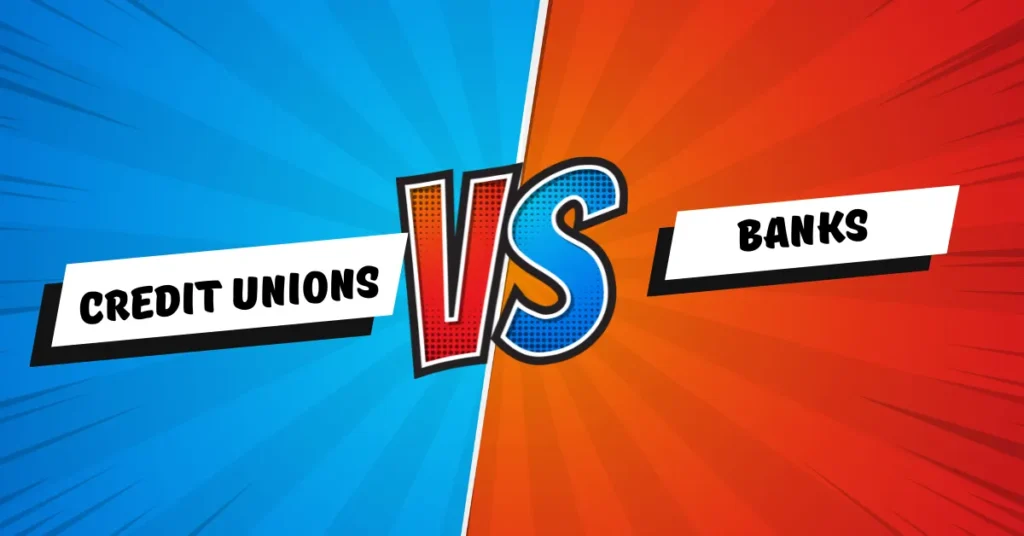Credit Unions vs Banks: When it comes to choosing a financial institution, understanding the differences between credit unions and banks is essential.
Both types of institutions offer similar services, such as savings accounts, checking accounts, and loans, but they operate differently.
Here’s a detailed comparison to help you make an informed decision.
Credit Unions

Overview
Credit unions are member-owned, not-for-profit institutions that prioritize serving their members rather than generating profits.
They typically offer more personalized services and can provide better rates due to their non-profit status.
Key Features
- Ownership: Credit unions are owned by their members. Each member has a vote in the union’s decisions, which promotes a community-oriented approach.
- Rates and Fees: Credit unions generally offer lower loan rates, higher savings rates, and lower fees compared to banks.
- Customer Service: Credit unions are known for their customer-centric approach, often providing more personalized service.
- Membership Requirements: Membership is often based on specific criteria, such as geographic location, employer, or membership in a particular organization.
- Non-Profit Status: As non-profits, credit unions reinvest earnings into services and benefits for members, rather than distributing profits to shareholders.
Pros
- Lower interest rates on loans and higher interest rates on savings accounts.
- Lower fees for account maintenance and other services.
- Strong focus on customer service and community involvement.
Cons
- Limited branch and ATM availability compared to large national banks.
- Membership requirements can restrict access.
- Fewer product offerings and technological advancements compared to big banks.
Banks
Overview
Banks are for-profit institutions owned by shareholders.
They aim to generate profits for their shareholders and offer a wide range of products and services.
Key Features
- Ownership: Banks are owned by shareholders who invest in the institution to earn profits.
- Rates and Fees: Banks tend to have higher fees and may offer lower rates on savings accounts and higher rates on loans.
- Customer Service: Banks provide extensive services but may lack the personalized touch of credit unions.
- Accessibility: Banks often have a large network of branches and ATMs, offering greater convenience.
- Technological Advancements: Banks generally invest heavily in technology, providing advanced online and mobile banking features.
Pros
- Extensive branch and ATM networks, often nationwide.
- Wide range of products and services, including advanced technology and investment services.
- More lenient membership requirements; anyone can open an account.
Cons
- Higher fees and less favourable interest rates compared to credit unions.
- Less personalized customer service.
- Profit-driven, with earnings distributed to shareholders rather than reinvested into member benefits.
Recommended Reading
- Finance & Insurance HUB
- The Best Health Insurance in the USA: A Complete Guide
- Comprehensive Insurance for 4-Wheelers: A Complete Guide
- How to Purchase Insurance: A Comprehensive Guide
- How to Purchase Health Insurance and Where to Buy It
- Understanding the Health Insurance Marketplace: A Comprehensive Guide
- Loan Against Property: A Comprehensive Guide
Comparison Chart | Credit Unions vs Banks
| Feature | Credit Unions | Banks |
|---|---|---|
| Ownership | Member-owned | Shareholder-owned |
| Profit Model | Non-profit | For-profit |
| Interest Rates | Lower loan rates, higher savings rates | Higher loan rates, lower savings rates |
| Fees | Generally lower | Generally higher |
| Customer Service | More personalized | Can be less personal |
| Accessibility | Fewer branches and ATMs | Extensive branch and ATM networks |
| Membership Requirements | Specific criteria (location, employer, etc.) | Open to anyone |
| Technology | Limited but improving | Advanced online and mobile banking features |
| Community Focus | Strong community involvement | Less community-oriented |
Conclusion
The choice between a credit union and a bank depends on your individual needs and priorities.
If you value lower fees, better interest rates, and personalized service, a credit union may be the better option.
However, if you prioritize convenience, a wide range of products, and advanced technological features, a bank might be more suitable.
Consider your financial habits, goals, and preferences when making your decision.
For further reading, you can explore the following sources:
- NerdWallet’s Guide on Credit Unions vs. Banks
- Investopedia’s Comparison of Banks vs. Credit Unions
- The Balance’s Article on Credit Unions vs. Banks